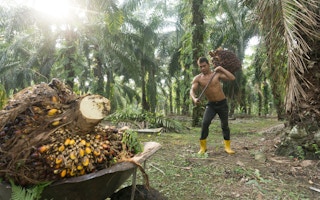In recent weeks, I attended two events that prompted me to start inspecting the labels of cosmetics, detergents and packaged foods in my house. I was looking for evidence of palm oil products, in response to a staggering claim that half of what the average family buys has been touched in some way by palm oil — everything, it seems, from chocolate and margarine to sauces and soaps.
My search quickly turned up ‘sustainable palm fruit oil’ in some oatcakes and a palm oil derivative, ethylhexyl palmitate, in my wife’s lipstick. The reference to sustainability and science got me thinking that palm oil has brought prosperity to the countries in the global South that produce it.
And yet it has also rapidly earned a bad reputation. Its production is closely associated with problems such as large-scale clearing of tropical rainforests, loss of biodiversity, pollution, disruption to local livelihoods, ‘land grabbing’ and, to top it all, human rights violations.
Palm oil is pressed from the fruit of the oil palm tree which is indigenous to West Africa. Since the nineteenth century it has been cultivated in South-East Asia, but nowadays it is also grown in tropical rainforests from the Congo Basin in Africa to Colombia and Peru.
In Malaysia alone, oil palm plantations more than doubled in area between 1990 and 2005, to take up roughly one eighth of the country’s land — an astonishing 4.2 million hectares.
The African oil palm tree is so attractive because every hectare of plantation can produce around four tonnes of oil a year — more than rapeseed, sunflower or soybean. This, coupled with the insatiable global demand for vegetable oil, means that oil palm plantations are here to stay.
So the big question is: can palm oil be contained, avoiding the constant felling of tropical trees and habitat destruction involved in producing it?
Two knowledge gaps
The Roundtable on Sustainable Palm Oil (RSPO), set up in 2004, seemed a positive step. RSPO certification implies that a plantation has met certain criteria including transparency and a commitment to employees’ rights, and it prohibits cultivation on land with ‘high conservation value’.
The RSPO is also supposed to regulate the creation of new plantations and the use of pesticides and herbicides. However, the scientific basis for some certification criteria, including high conservation value, remains unclear.
Few would deny that knowledge acquisition through research is vital in this situation. But what research is needed?
“
Vásquez said deforestation research is based on satellite data, but this is far removed from a real understanding of how deforestation and palm oil plantations affect people on the ground.
One area to investigate is ways of cultivating oil palm without simply abandoning worn-out plantations. Using the whole palm can generate fertiliser and improves the soil, avoiding the constant felling of forests to bring new land into cultivation.
Another area is local livelihoods, improving understanding of how losing forest to palm oil plantations affects people who depend on those forests.
Increasing knowledge in both areas would provide a stronger case for limiting palm oil plantations.
This was reinforced by the first of the events I mentioned above: a press conference organised by NGO the Forest Peoples Programme in London, United Kingdom.
I listened to a delegation of indigenous, community and civil society leaders from Colombia, Indonesia, Liberia and Peru. They all questioned the validity of the RSPO and argued for research that is more socially aware. One by one, they provided impassioned testimonies of forest destruction, smouldering forest fires and people’s intimidation and eviction from their homelands in the wake of the relentless spread of oil palm plantations.
The event was the last leg of the delegation’s European tour, during which they met policymakers, industry chiefs, financiers and NGOs to call for urgent action in the European Union — a major palm oil importer.
The problem with remote research
The question of exactly what kind of research is needed, and who should conduct it, was elegantly stated by Robert Guimaraes Vásquez, a leader of the Shipibo-Conibo indigenous people of the Peruvian Amazon, who made an emotional statement calling European consumers to realise they are “drinking our blood” when they consume products derived from palm oil.
Vásquez said deforestation research is based on satellite data, but this is far removed from a real understanding of how deforestation and palm oil plantations affect people on the ground.
On a napkin, he sketched out for me a rectangle, explaining that this was a typical household smallholding in his area as recognised by the Peruvian government. He pointed to the blank area around this cultivated rectangle — it is from this area of forest that the household gets its water, fruit, meat, fish and many other products essential to its livelihood, he said.
Until this blank space is filled in with data from scientific research, policymakers are unlikely to properly understand the impact of indiscriminately establishing plantations on land that is technically ‘unused’.
His lament was that governments currently rely on data from palm oil companies to decide which parts of a forest to give to which firms, but this data is tinged with bias.
At the second event I attended, a Newton Fund networking event hosted by the British Council last month in London, I heard the scientific advisor to the Malaysian prime minister say that the purpose of science, from his government’s perspective, is to create wealth and jobs for young people.
One of the other Malaysian delegates whispered to me that Malaysia has, in fact, many unfilled jobs in scientific research.
There is surely an excellent opportunity to tackle both these challenges. The wealth contained in rainforests, tapped through the expertise of people living in them, must be fully recognised — and research could be directed towards this end. Malaysia could lead the way, just as it pioneered oil palm plantations.
A wider range of research is needed to inform plans for the future of palm oil and how it can be sustainably produced.
Kaz Janowski is editor at SciDev.Net. This article was originally published on SciDev.net.











